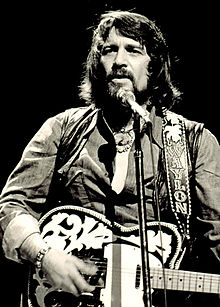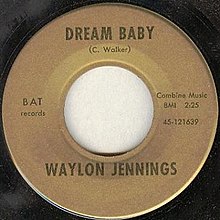Waylon Jennings
Waylon Arnold Jennings (born June 15, 1937 in Littlefield , Texas , † February 13, 2002 in Chandler , Arizona ) was an American country singer and musician. Alongside Willie Nelson, he was the most successful singer in the outlaw movement . His nickname was Waymore .
Life
Childhood and youth
Waylon Jennings was born in 1937 to William Albert and Lorene Bea Jennings on a farm near the small town of Littlefield, Texas. The name on his birth certificate was Wayland, but his mother changed the spelling after he was baptized. The family later moved to Littlefield, where they lived with twelve people in a two-bedroom cabin and owned a shop. In order to secure a living, Jennings worked in the cotton fields from early childhood. At the age of eight he learned to play the guitar from his mother; at twelve he got a job as a disc jockey for a small local radio station .
Beginnings
In 1954 he moved to Lubbock , Texas, where he again worked as a disc jockey for a radio station. In 1958 he met rock 'n' roll star Buddy Holly . Holly had just separated from his backing band, the Crickets , and was looking for new band members. When Holly found out that Jennings was playing bass , he accepted him into his new band. Jennings toured the southern United States with Holly. Holly was, as Jennings described, a kind of mentor to him. He produced Jennings' first recording Jole Blon in 1958 , on which Holly also worked as a guitarist.
On February 2, 1959, Holly chartered a Beechcraft Bonanza to fly to the next gig in Moorhead , Minnesota , while some of the tour members were to catch the bus. Because there were problems with the heating in the tour bus and The Big Bopper showed signs of flu and therefore refused to drive, Jennings, who was actually scheduled for the flight, let him sit on the plane. During the night the machine got caught in a storm and crashed; with Bopper, Holly, Richie Valens and the pilot were also killed.
When Jennings learned of the death of his friends and band members, he was devastated. He felt guilty that his last words to Holly were, "I hope your ole plane crashes." It was a long time before Jennings returned to music. He later recorded Bopper's song White Lightnin ' , which was already a country hit in the version by George Jones .
Beginning of the solo career
After returning to Texas radio for a brief period, Jennings moved to Phoenix , Arizona. There he founded his band The Waylors and performed with them regularly in JD’s bar . This is where its typical sound developed. He mixed rock 'n' roll, folk and country and used only electric instruments except for drums. He released his first album Waylon Jennings at JD’s at A&M Records in Los Angeles , which was largely made up of cover versions of successful musicians at the time such as Roy Orbison ( Crying , Dream Baby ), Buck Owens ( Love's Gonna Live Here Again ) or Bob Dylan ( Don't Think Twice, It's All Right ) and his first single after Holly's death, Four Strong Winds . One day, country singer Bobby Bare came into town and heard Jennings play. He then called his producer Chet Atkins in Nashville . Since Jennings was under contract with A&M, RCA had to buy him out of the contract, after which he received a recording contract with RCA. His first single there was released on March 16, 1965.
Shortly thereafter, he moved to Nashville. There he shared an apartment with Johnny Cash . The two quickly became friends and were soon known as The Hellraisers . Jennings was also successful in other ways, such as in the film Nashville Rebel , in which Jennings played the lead role. His next two records, The Chokin 'Kind and Only Daddy That'll Walk the Line , both made the Billboard Top Ten, the latter at number two. His collaboration with the Kimberleys earned him a Grammy for the joint title McArthur Park . Jennings had one of his first major television appearances alongside the Porter Wagoner Show on the Johnny Cash Show .
breakthrough
Despite his successes, Jennings was not satisfied. Above all, the typical procedure of the record company bothered him. RCA chose which songs he sang and which musicians he recorded them with. Gradually he got more freedom, chose his own songs, produced his own songs and played with the Waylors. In 1969, after various failed marriages, he married the country singer Jessi Colter , with whom he has a son, Shooter , who also became a country musician.
Because of his idiosyncratic methods and his inappropriate music, the press soon assigned Jennings and a few other artists to the so-called outlaw movement . His albums Lonesome, On'ry and Mean and Honky Tonk Heroes were great hits. Also his following singles I'm a Ramblin 'Man and Are You Sure Hank Done It This Way? sold well. He had his first number one hit in 1974 with This Time . In 1975 he was named Singer of the Year by the Country Music Association .
Jennings had his big break in 1975 with Good Hearted Woman , a duet with Willie Nelson. The accompanying album Wanted: The Outlaws , which he released with Nelson, his wife Jessi Colter and Tompall Glaser , otherwise contained older material. It was the first country album to sell more than a million copies. As a result, Jennings celebrated further successes, including 1977 with Luckenbach, Texas and Mamas, Don't Let Your Babies Grow Up To Be Cowboys together with Nelson, the latter won a Grammy for best duet. Jennings had long been dependent on pills but was able to overcome his addiction and continue his career.
1980s and 1990s
By the mid-1980s, Jennings repeatedly topped the charts, for example with I've Always Been Crazy , Amanda , I Ain't Living Long Like This , Rose In Paradise and Lucille . He also appeared in the television series A Duke Seldom Comes Alone , for which he wrote and sang the title song and acted as a narrator. In 1983 he went on a concert tour through Germany.
Jennings also made up for his high school diploma after dropping out of tenth grade. As his record sales were in decline, he lost his record deal with RCA. He signed first with MCA , then with Epic Records . Together with his longtime friends Johnny Cash, Willie Nelson and Kris Kristofferson he founded the band The Highwaymen . Their single Highwayman reached number 1 on the charts; two more albums followed. He was also increasingly involved as an actor, for example as a guest on the US sitcom A Terribly Nice Family . In 1986 he appeared with Cash, Nelson and Kristofferson in Hell's Journey to Lordsburg , a remake for television of John Ford's Ringo , as a player on Hatfield. After he got his record deal back with RCA, he released more albums. In 1991 he brought out the album Waylon And Willie: If I Can Find a Clean Shirt together with Willie Nelson, with whom he had not only realized musical but also social projects .
Sickness and death
Health problems forced Jennings to give up his tours in 1997. In 2001 one of his feet had to be amputated due to diabetes . That same year he was inducted into the Country Music Hall of Fame . However, he was unable to attend the admission ceremony due to health problems; instead, his son Shooter received the award.
Waylon Jennings died on February 13, 2002 at the age of 64 at his Chandler, Arizona home. He was buried in Mesa City Cemetery in Mesa , Arizona.
Discography
|
|
literature
- Waylon Jennings: Waylon - An Autobiography. Warner Books, 1997, ISBN 0-446-51865-4
Web links
- Waylon Jennings at Allmusic (English)
- Full biography (English)
- Waylon Jennings in the Handbook of Texas (English)
- Biography and photo gallery at CMT (English)
- Biography on country.de
- Waylon Jennings in the Internet Movie Database (English)
Individual evidence
- ↑ 1959: Buddy Holly killed in air crash , news.bbc.co.uk (archive), January 31, 2012
- ↑ a b List of Waylon Jennings's GRAMMY Awards history on www.grammy.com, accessed January 31, 2018
| personal data | |
|---|---|
| SURNAME | Jennings, Waylon |
| ALTERNATIVE NAMES | Jennings, Waylond Arnold (full name); Waymore (nickname) |
| BRIEF DESCRIPTION | American country musician |
| DATE OF BIRTH | June 15, 1937 |
| PLACE OF BIRTH | Littlefield , Texas |
| DATE OF DEATH | February 13, 2002 |
| Place of death | Chandler , Arizona |


